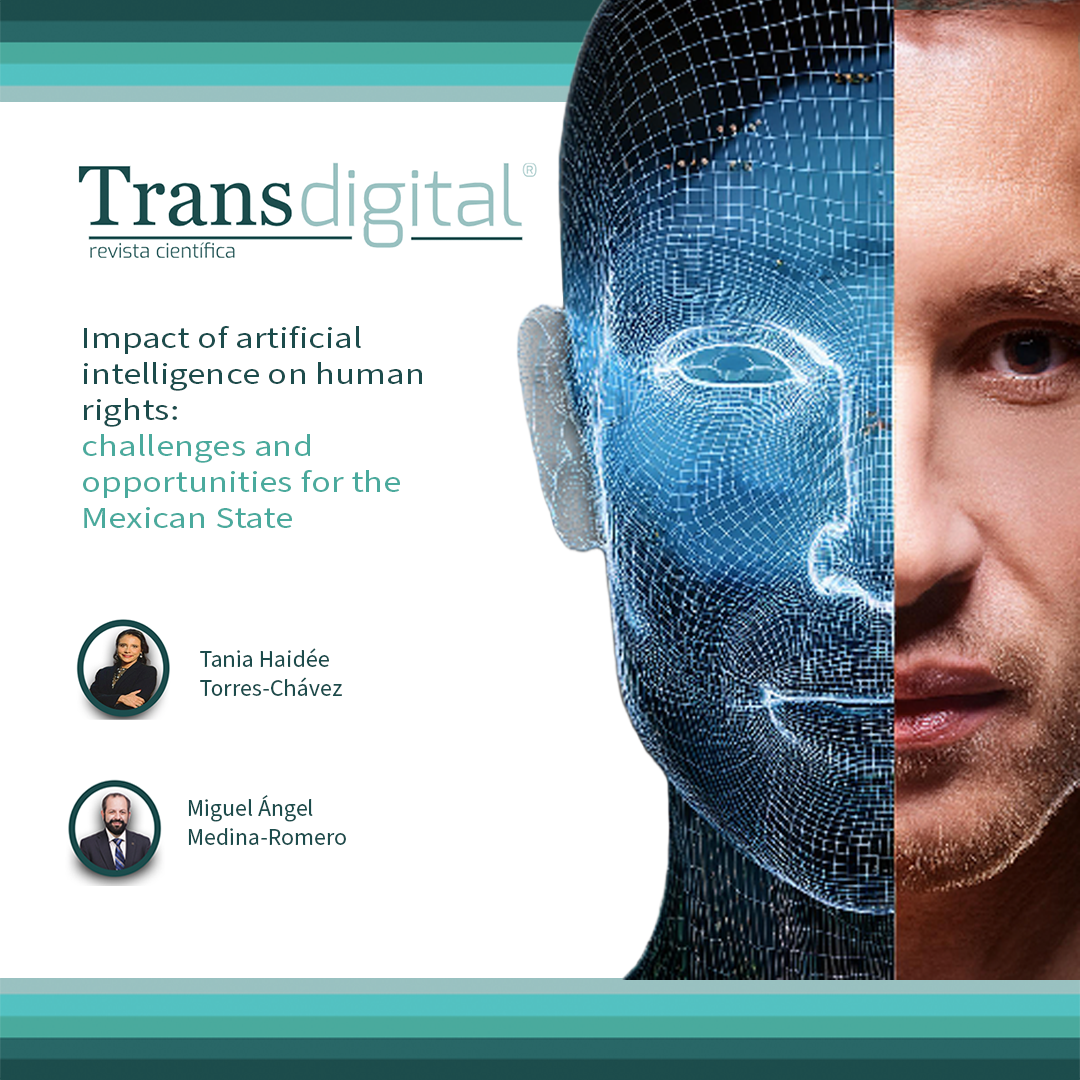Impact of artificial intelligence on human rights
challenges and opportunities for the Mexican State
DOI:
https://doi.org/10.56162/transdigital363Keywords:
human rights, artificial intelligence, ethics, regulation, human dignityAbstract
The study analyzed how artificial intelligence (AI) must operate within ethical and legal boundaries to improve human interaction and enable a fulfilled life. This analysis is crucial due to the presence of AI in everyday life and the impact it has on human dignity and fundamental rights. Considering the Mexican context, the need to adapt regulations to protect human rights in the face of technological advance was highlighted. This is essential to ensure that AI contributes to society without compromising the privacy and personal information of individuals. It was detected that specific regulations are lacking in Mexico. Additionally, risks such as privacy violation and potential job displacement were identified. For this reason, it is urgent to establish regulatory frameworks that guide the ethical use of AI. Failure to address these challenges will affect people's dignity and fundamental rights. It was concluded that the government, academia, and civil society must collaborate to develop public policies and ethical frameworks that regulate the use of AI. This will ensure that technology is used responsibly and promotes an environment of respect and fairness.
References
Al-Rodhan, N. (2021). Artificial intelligence: Implications for human dignity and governance. Página web oficial de Oxford Political Review. https://oxfordpoliticalreview.com/2021/03/27/artificial-intelligence/
Campolo, A., Sanfilippo, M., Whittaker, M., & Crawford, K. (2017). AI Now 2017 Report. AI Now Institute. https://ainowinstitute.org/wp-content/uploads/2023/04/AI_Now_2017_Report.pdf
Carbonell, M. (2019). Los Derechos Fundamentales en México. Porrúa.
Corona Nakamura, L. A., & González Madrigal, J. A. (2023). La Perspectiva Ética y Jurídica de la Inteligencia Artificial en México. Misión Jurídica, 199-214. https://doi.org/10.25058/1794600X.2261
Fernández Polcuch, E. (2023). Hacia una Inteligencia Artificial desde un enfoque de Derechos Humanos: artículo de opinión. Página web oficial de la UNESCO. https://www.unesco.org/es/articles/hacia-una-inteligencia-artificial-desde-un-enfoque-de-derechos-humanos-articulo-de-opinion
Hegel, G. (2018). Lecciones sobre la Historia de la Filosofía III. Fondo de Cultura Económica.
Marr, B. (2023). Estos son los 15 mayores riesgos de la IA. Fomentar la concienciación sobre estos problemas nos ayuda a entablar conversaciones en torno a las implicaciones legales, éticas y sociales de la IA. Forbes. https://forbes.es/tecnologia/316482/estos-son-los-15-mayores-riesgos-de-la-ia/
Medina-Romero, M. Á. (2024). Aplicaciones de la Inteligencia Artificial para la investigación y la innovación en la educación superior. Revista Social Fronteriza, 4(4), e44336. https://doi.org/10.59814/resofro.2024.4(4)336
Naciones Unidas. (2021). Los riesgos de la inteligencia artificial para la privacidad exigen medidas urgentes. Página web oficial de las Naciones Unidas. https://www.ohchr.org/es/press-releases/2021/09/artificial-intelligence-risks-privacy-demand-urgent-action-bachelet
Naciones Unidas. (2024). What are human rights?. Página web oficial de las Naciones Unidas. https://www.ohchr.org/en/what-are-human-rights
Real Academia Española. (2023). Inteligencia. Página web oficial del Diccionario de la lengua española. https://dle.rae.es/inteligencia?m=form
Sabater, A., & De Manuel, A. (2024). Una mirada y discusión a través de la literatura especializada y de opiniones expertas. Universitat de Girona. https://www.udg.edu/ca/Portals/57/OContent_Docs/Informe_OEIAC_2021_cast.pdf
SEGOB. (2011). Decreto por el que se reforman, adicionan y derogan diversas disposiciones de la Constitución Política de los Estados Unidos Mexicanos, en materia de derechos humanos. Página web oficial del Diario Oficial de la Federación. https://dof.gob.mx/nota_detalle.php?codigo=5194486&fecha=10/06/2011
Sigman, M., & Bilinkis, S. (2023). Artificial, la nueva inteligencia y el contorno de lo humano. Penguin Random House Grupo Editorial.
UNESCO. (2024). Recomendación sobre la ética de la inteligencia artificial. Página web oficial de la UNESCO. https://www.unesco.org/es/legal-affairs/recommendation-ethics-artificial-intelligence

Downloads
Autor de correspondencia
El autor de correspodencia se identifica con el siguiente símbolo: *Published
How to Cite
License
Copyright (c) 2024 Tania Haidée Torres-Chávez, Miguel Ángel Medina Romero

This work is licensed under a Creative Commons Attribution 4.0 International License.
All articles in Transdigital are licensed under a Creative Commons Attribution 4.0 International License. Authors hold the copyright and retain publishing rights without restrictions.









